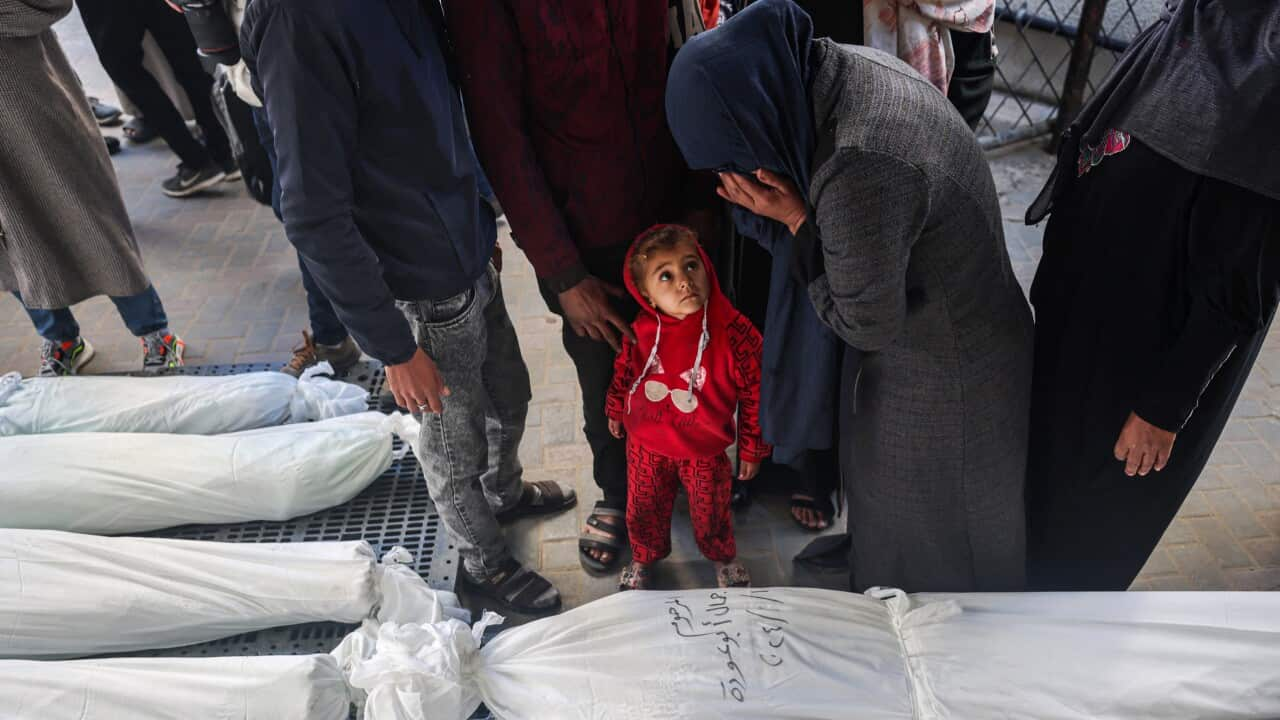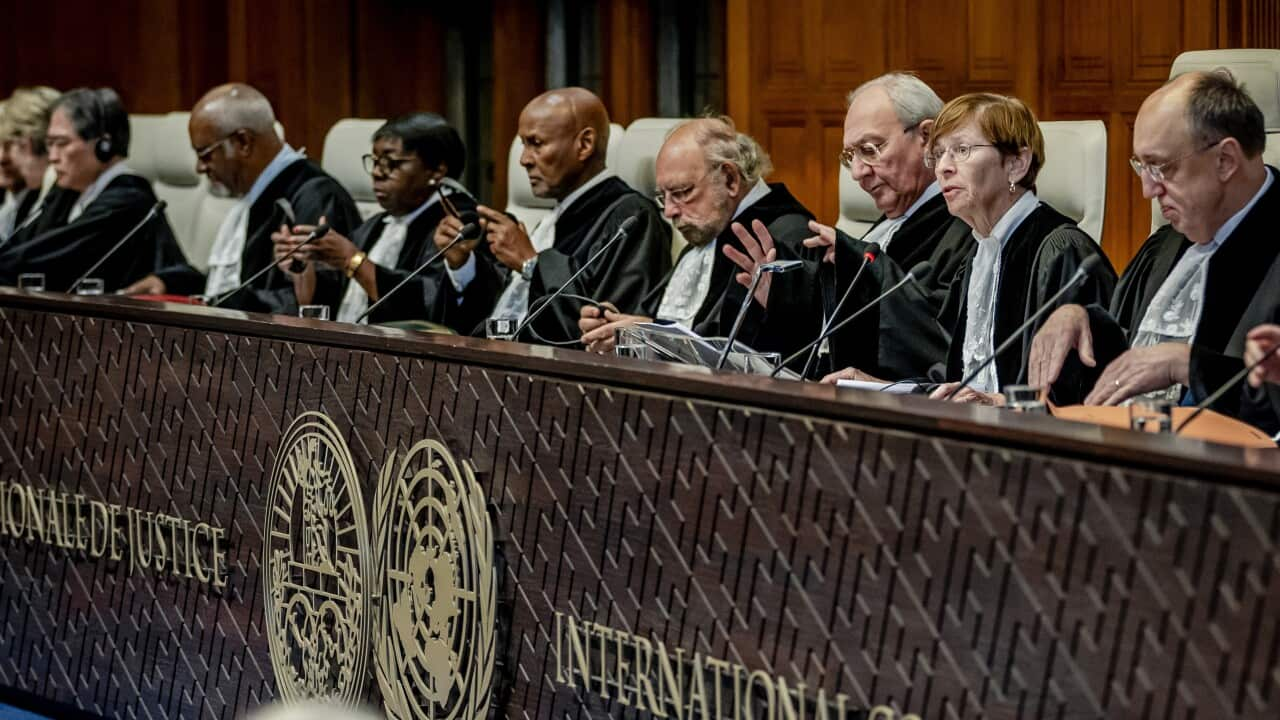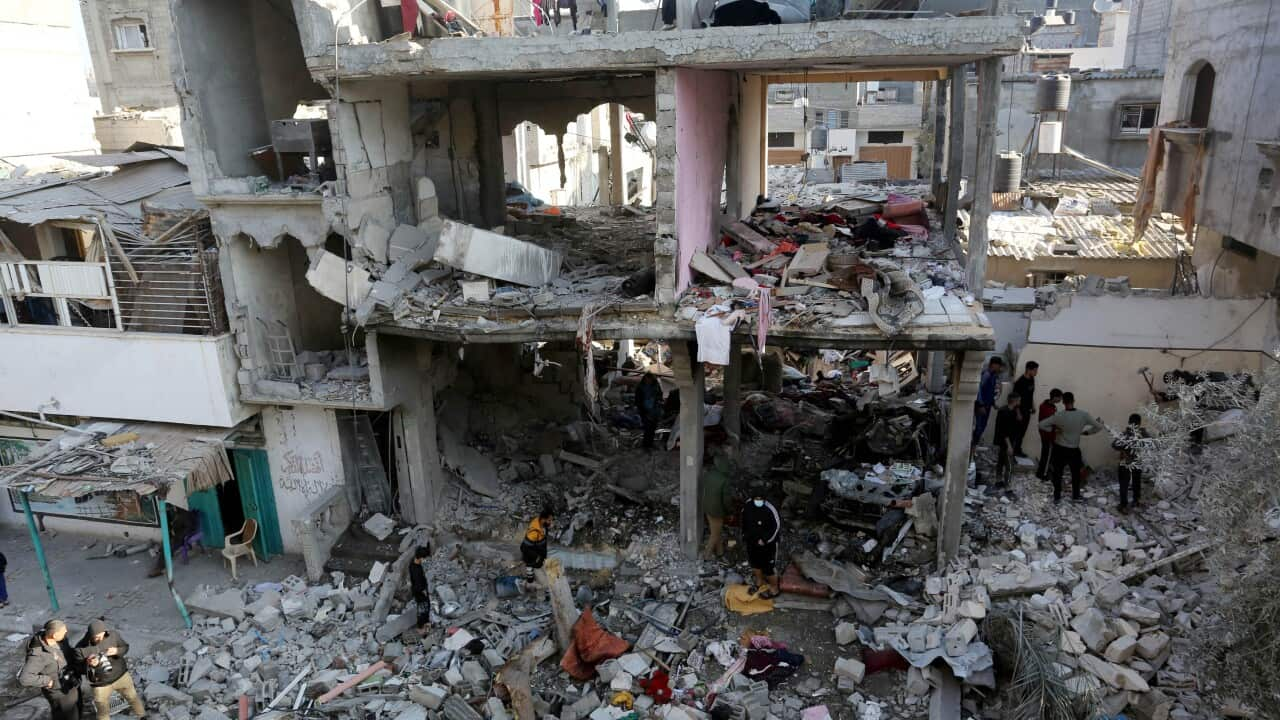

10 min read
This article is more than 1 year old
Feature
'Today they're all dead': The harrowing diary entries of a surgeon in Gaza
What compelled Dr David Hasan to take a break from a life of comfort in the US and rush to war-torn Gaza? In an exclusive interview with SBS News, he shares his experiences treating patients in the near-absence of basic medical facilities.
Published 21 January 2024 6:34am
Updated 21 January 2024 9:26pm
By Christy Somos
Source: SBS News
Image: Gaza's health ministry says more than 24,000 Palestinians have been killed with another 61,154 reportedly injured. (Getty / AFP)
Warning: This story contains details and images that are graphic and may be distressing to some. Viewer caution is advised.
Day Four: Human tragedy
Horrible morning. Mass casualties. Had to pronounce a toddler dead. No one was with him ... I named him like he was my own son, Jacob. Then I held him and wept for him.
This is a diary entry by Dr David Hasan, an American neurosurgeon from North Carolina who was part of an international medical aid mission to Gaza.
While he was there, his wife, Dr Lauren Hasan, a trauma surgeon, , which have been viewed and shared thousands of times.
He spoke with SBS News about what he witnessed and why he chose to drop everything and head to a combat zone.
"I've been a neurosurgeon for almost 15 years," Hasan told SBS News from the US.
Hasan has enjoyed a celebrated career in neurosurgery, teaching at Duke University School of Medicine and attaining extensive research credentials with more than 270 publications, National Institutes of Health grants and membership on the boards of several medical journals.
He credits his seven-year-old daughter Hannah and his wife for supporting his decision to leave the US during the Christmas holidays for a week in a war zone.
"She was amazing," Hasan said, referring to Hannah.
"She went and bought small toys and a big bag of lollipops that I could pack in my suitcase and asked me to give it to the kids on Christmas day."

David Hasan with his wife Lauren and seven-year-old daughter Hannah. They live in North Carolina in the US. Source: Supplied
When an opportunity presented itself after the on 22 December which called for increased aid to Gaza, Hasan sprang into action.
"For me, the decision really wasn't hard," he said.
"I knew the consequences, I knew what could happen … but when you think of what happened to these kids and see pictures on social media, you just don't think of yourself anymore."
Hasan stepped into what a "graveyard for children."
Three months of military action by Israel on Gaza has reduced vast swaths of it to rubble, displacing almost all of its 2.3 million residents and killing more than 24,000, mostly women and children according to the UN.
The military action is in response to , in which 1,200 people were killed and approximately 240 taken hostage, according to the Israeli government.

Hasan shared images of the devastation he witnessed on the ground in southern Gaza. Source: Supplied
Israel has vowed to destroy Hamas and continue their attacks until all hostages are returned. Israel has been investigated by the International Criminal Court since 2021 as part of an inquiry into alleged war crimes in the Palestinian territories dating back to 2014, including the recent attacks of both Israel and Hamas.
Israel's siege of Gaza following the 7 October attack has largely prevented food, fuel, medicine and international media from entering, creating what the UN describes as a "humanitarian catastrophe".
Working in those conditions, Hasan penned diary entries, some of which have been excerpted below.
Day One: Journey into Gaza
Twelve hours journey to Rafah crossing. Eleven Egyptian checkpoints ... miles and miles of 18-wheelers on four sides of the highway — the most inefficient way to transfer aid. Days to get food and supplies across. Sometimes one to two weeks. By the time the trucks cross the border, the food is spoiled.
The first obstacle to overcome for Hasan and his team put together by , an independent aid organisation, was simply getting to the Rafah border crossing in Egypt — and then getting into south Gaza.
Hasan, along with a team of medical professionals from Canada and the US, entered Gaza on 26 December.

Trucks carrying humanitarian aid line up at the Rafah Border Crossing on the way to Gaza. Hundreds of trucks are lined up at Rafah, sometimes waiting weeks to go through the process. Source: AP / Amr Nabil
"We saw a sea of refugees, displaced families that live on the premises of the two hospitals in Khan Younis."
Hasan estimated there were over 100,000 people inside and outside Nasser Hospital and the European Hospital. It's estimated 85 per cent of Gaza's 2.3 million people are displaced.
Staff were on the brink, he added.
"They're just exhausted. They're overwhelmed. They've been working 90 days [plus] non-stop," he said.
"They stay in the hospital 24 hours a day, and they don't know if their family is alive or not."
Day Two: First day at work
Crossed Rafah ... Started operating on several burst fractures & head injuries. By sunset, the bombardment started & went on non-stop all night. So close, only two miles away. The first bombing was so violent, I fell off my step stool & the whole OR (operating room) shook so badly. But we kept operating non-stop.
Hasan described the chaos, fear and suffering inside the hospital.
"As you walk in the hospital, you see people are just living and sleeping in the hallways … each family just kind of carved a little corner or a little part of the hallway or an office and they live there," he said.
Hospitals are one of the few places in Gaza thought to be safer from Israel's attacks.
Hasan said the bombing picks up at night, and those hit or stuck under the rubble must wait until morning to be rescued as "anything that moves at night gets annihilated".
According to Hasan, that means most of the casualties that arrive — 80 or 90 per cent of them — have bled out, are dead or not able to be saved.
"We saw kids, women, adults. I saw a kid that was just blown to pieces — they had to carry him in a bag just to put these pieces together," he said.
Day Three: Hospitals in chaos
Food is very scarce. Water is a very valuable commodity. Access to bathroom is a privilege ... I had to operate on a kid, a five-year-old girl, the only survivor of 37-member family, with severe depressed skull fracture and another four-year-old with a sniper bullet.
Hasan said every resource had to be diverted from non-immediate emergencies like cancer or diabetes to broken, bleeding bodies.
"There are some people there, you look at them barely surviving and you just say, 'I can't help you,'" he said.
"We don't have the equipment, we don't have the supplies, and so they just crash in front of you."

Using the hospital bathroom was a "privilege". Water was cut off and lack of sanitation meant disease spread quickly. Source: Supplied
"So while I can compartmentalise it while I'm in surgery, when I go home and lay down my head, these images flash again and again — you cannot forget them."
Entire families gather at dusk, and if they have food and water, they share it amongst themselves, he said.
"They all hug each other and kiss each other and tell each other they love the other — because they don't know what will happen in the morning."
Day Five: Small wave of the tsunami
One particular story that tore my heart to pieces is of three kids, 10, six and one and a half years old ... They have no extended family ... The 10-year-old instantly became the care provider for the six and the one-and-a-half-year-old. The most brave and strong young girl I’ve ever seen. She never cried.

Healthcare workers use the acronym WCNSF — wounded child, no surviving family — in Gaza, according to Doctors Without Borders. Source: Supplied
Some faces were unrecognisable to loved ones after being crushed by the rubble.
Hasan said he thinks that Gaza probably has 50,000 to 60,000 new amputees since Israel began their assault.
"After the surgery, the wounds get infected, we see maggots, and we lose them."
"They have no gowns to wear to go do the surgery. They have no antibiotics to treat. They have no morphine or ketamine to sedate — they had to amputate patients without any sedation," Hasan said.
Diseases are rampant.
Flu, hepatitis, cholera and COVID are spreading through refugees and patients alike, .
Trash was piling up.
"This is only the beginning, the trauma is the small wave of what could be the tsunami of diseases that could affect this population," he said.

Some images — despite Hasan's extensive professional training as a surgeon — will not go away. Source: Supplied / David Hasan
Day Six: Emergency vs emergency
By the afternoon we had two emergencies that we needed to operate on, but the ORs are full again ... only one can go and the other one has to wait. Who do I choose to operate on and who do I let go and how do I do that? I decided I'll operate on both of them simultaneously in one room ... I went to go scrub quickly, but now there is no water.

Hasan said infrastructure in and around the hospital was gone. Source: Supplied
"I'm not the kind of person who talks about emotion, it's the way I was trained," he said.
"At one point, when the bombing was getting closer and closer to the hospital, it [became] more of a documentation to my daughter … just in case something happened."
Hasan said sending over his diary entries also became a form of communication to his wife that he was alive.
"At one point I told my wife, 'If you don’t hear anything from me in 24 hours, just make sure you alert the State Department,'" he said.
The diary entries were also something for his daughter to understand why he made the journey.
"I wanted more than anything, if something happened, to have these threads of a biography that my daughter could live with and see why dad had to leave and help … I never wanted her to regret that she let me go to Gaza."

Sending his diary entries also became a form of communication with his wife that he was alive. Source: Supplied
Day Seven: Headed home
Now in the van heading to Rafah, exit ... My body crossed Rafah, but my soul, spirit and heart are still with my Gazans.
Hasan is now back home in the US.




